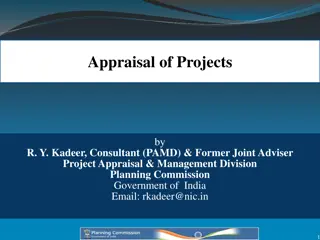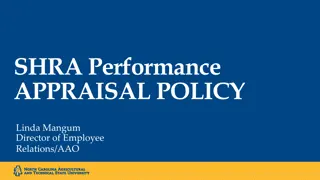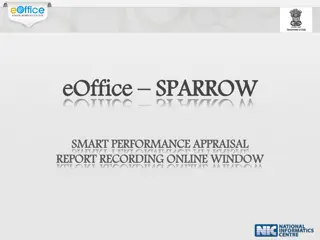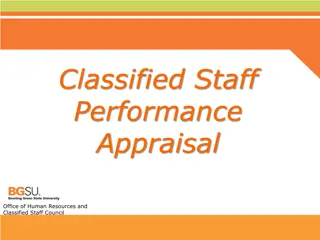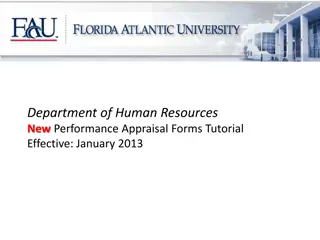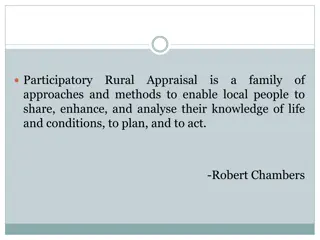
Understanding Performance Appraisal in the Workplace
"Performance appraisal is a critical tool for evaluating employee performance, identifying strengths and weaknesses, guiding development, and determining compensation packages. Learn about its objectives, advantages, impact on promotions, compensation, and employee development." (Word count: 29)
Download Presentation

Please find below an Image/Link to download the presentation.
The content on the website is provided AS IS for your information and personal use only. It may not be sold, licensed, or shared on other websites without obtaining consent from the author. If you encounter any issues during the download, it is possible that the publisher has removed the file from their server.
You are allowed to download the files provided on this website for personal or commercial use, subject to the condition that they are used lawfully. All files are the property of their respective owners.
The content on the website is provided AS IS for your information and personal use only. It may not be sold, licensed, or shared on other websites without obtaining consent from the author.
E N D
Presentation Transcript
Dr Digvijay Sharma School of health Sciences
Performance Appraisal Performance Appraisal is the systematic evaluation of the performance of employees and to understand the abilities of a person for further growth and development.
Performance appraisal Performance appraisal is generally done in systematic ways which are as follows: The supervisors measure the pay of employees and compare it with targets and plans. The supervisor analyses the factors behind work performances of employees. The employers are in position to guide the employees for a better performance
Objectives of Performance Appraisal Performance Appraisal can be done with following objectives in mind: To maintain records in order to determine compensation packages, wage structure, salaries raises, etc. To identify the strengths and weaknesses of employees to place right men on right job. To maintain and assess the potential present in a person for further growth and development. To provide a feedback to employees regarding their performance and related status. To provide a feedback to employees regarding their performance and related status. It serves as a basis for influencing working habits of the employees. To review and retain the promotional and other training programmes
Advantages of Performance Appraisal It is said that performance appraisal is an investment for the company which can be justified by following advantages:
Promotion Performance Appraisal helps the supervisors to chalk out the promotion programmes for efficient employees. In this regards, inefficient workers can be dismissed or demoted in case.
Compensation Performance Appraisal helps in chalking out compensation packages for employees. Merit rating is possible through performance appraisal. Performance Appraisal tries to give worth to a performance. Compensation packages which includes bonus, high salary rates, extra benefits, allowances and pre- requisites are dependent on performance appraisal. The criteria should be merit rather than seniority.
Employees Development The systematic procedure of performance appraisal helps the supervisors to frame training policies and programmes. It helps to analyze strengths and weaknesses of employees so that new jobs can be designed for efficient employees. It also helps in framing future development programmes.
Selection Validation Performance Appraisal helps the supervisors to understand the validity and importance of the selection procedure. The supervisors come to know the validity and thereby the strengths and weaknesses of selection procedure. Future changes in selection methods can be made in this regard.
Communication For an organization, effective communication between employees and employers is very important. Through performance appraisal, communication can be sought for in the following ways: Through performance appraisal, the employers can understand and accept skills of subordinates. The subordinates can also understand and create a trust and confidence in superiors. It also helps in maintaining cordial and congenial labour management relationship. It develops the spirit of work and boosts the morale of employees. All the above factors ensure effective communication.
Motivation Performance appraisal serves as a motivation tool. Through evaluating performance of employees, a person s efficiency can be determined if the targets are achieved. This very well motivates a person for better job and helps him to improve his performance in the future.
Types of Performance Appraisals Most performance appraisals are top-down, meaning supervisors evaluate their staff with no input from the subject. But there are other types: Self-assessment: Individuals rate their job performance and behavior. Peer assessment: An individual's workgroup or coworkers rate their performance.
360-degree feedback assessment: Includes input from an individual, supervisor, and peers. Negotiated appraisal: A newer trend that utilizes a mediator and attempts to moderate the adversarial nature of performance evaluations by allowing the subject to present first. Also focuses on what the individual is doing right before any criticism is given. This structure tends to be useful during conflicts between subordinates and supervisors.
Criticism of Performance Appraisals Performance appraisals are designed to motivate employees to reach and/or exceed their goals. But they do come with a lot of criticism. An issue with performance appraisals is that differentiating individual and organizational performance can be difficult. If the evaluation's construction doesn't reflect the culture of a company or organization, it can be detrimental. Employees report general dissatisfactionwith their performance appraisal processes
When Should a Performance Appraisal Take Place? Performance management is an ongoing process. Throughout the year, managers are encouraged to engage with employees to establish goals, note progress, and provide feedback. Formal reviews or appraisals often take place on a yearly or quarterly basis.
Refrences Prachi Juneja, Performance Appraisal, https://www.managementstudyguide.com/ Performance AppraisalBy ADAM HAYES, Updated August 22, 2021, https://www.investopedia.com/



